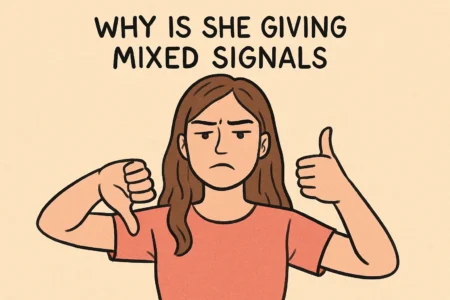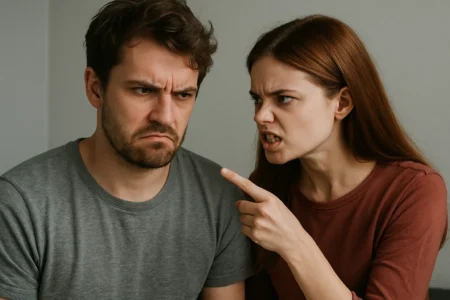Conflict. It feels like a cage match, doesn’t it? Every single time. The gloves come off, the volume shoots up, and a simple gripe about the dishwasher suddenly turns into World War III. You end up feeling misunderstood and pissed off. She feels unheard and hurt. Nobody wins.
But what if there was another way?
What if you could learn how to argue without fighting? This isn’t about just rolling over and letting her win. It’s about learning to play a completely different game. One where the goal isn’t to score points, but to actually connect. It’s about turning a destructive force into something that can, believe it or not, make your relationship stronger.
More in Relationship Health Category
How To Set Boundaries With Her
Red Flags Men Should Not Ignore
Key Takeaways
- Your Goal Isn’t Winning: Stop trying to be right. Your new mission: understand her side. The problem is the enemy, not your partner.
- The Power of “I Feel…”: Ditch “You always…” Starting with “I feel…” is a game-changer. It gets your point across without an attack.
- Know Your Flashpoints: What sends you from calm to furious in seconds? Figure out your triggers. Once you see them coming, you can choose not to let them drive.
- The Strategic Timeout: Taking a break isn’t weakness; it’s smart. When it gets too hot, pause. Agree to talk again when you’re both calm. It’s a circuit breaker.
- Listen to Hear, Not to Reload: Most of us just listen for a chance to jump in. Don’t. Your only job is to hear her out completely. Then you can think about a response.
Why Do Arguments So Often Turn Into Fights?
You know this story. A tiny spark hits a puddle of gasoline. A stray comment about weekend plans, maybe. And suddenly, wildfire. Voices get louder. Jaws clench. This isn’t about the weekend anymore, is it? Now you’re dragging out things from six months ago, and it’s become a raw, emotional slugfest. You can feel your pulse hammering in your ears, and you’re fighting the urge to either crush her with your point or just get the hell out.
Why? Why is it so hard to just disagree without going to war over it?
For a lot of guys, a switch gets flipped. You don’t want to fight. But the second you feel attacked, you’re on a runaway train. The conversation stops being about the dishes and starts being about your value as a man, a partner. The stakes feel huge. So you grab the only tools you have: attack and defend. Seeing this pattern is the first step. It’s not a character flaw. It’s a bad habit. Habits can be broken.
Is This Just a Biological Thing?
Let’s get the easy excuse out of the way. It’s just testosterone, right? Guys are just wired to fight.
Well, not really.
Blaming it all on biology is a cop-out. Yes, when you feel threatened—and a sharp criticism can feel like a tiger in the room—your body kicks into overdrive. Your brain’s ancient alarm system yanks the emergency cord, flooding you with adrenaline. That’s your “fight-or-flight” response. It’s a brilliant system for surviving a real threat. It’s an absolute disaster for a conversation in your kitchen. This physical reaction literally makes you dumber in the moment. Blood detours away from the part of your brain that handles logic. You are physically readying for battle, which makes you emotionally useless for a real talk. Biology gives you the jolt. You get to choose what to do with it.
What’s Really Happening When You Feel Attacked?
I’ll give you a look inside my own life. Years ago, my husband and I were terrible at arguing. I’d bring something up, and he’d either shut down or come out swinging. I thought I was just trying to solve a problem. He felt like he was being ambushed. It took a long time for me to get what was really going on. When I would say, “You didn’t take out the trash like you said you would,” he heard, “You are unreliable. You failed.”
My small complaint about a chore felt like a giant verdict on his character. And that’s the key. For so many men, your sense of self is built on being competent. When your partner is unhappy, it feels like a direct hit to that foundation. It feels like she’s saying you’re failing as a partner. So the fight isn’t about the trash. It’s a desperate defense of your own self-worth. The anger is just armor for a deeper fear: “Am I not good enough?”
How Can You Change the Game by Changing Your Goal?
If you change nothing else, change this. This one idea is everything. Seriously. Most of us go into a disagreement trying to win. We want to be right. We want the other person to admit they’re wrong. That framework is a fight. As long as that’s the game you’re playing, you’ll always have a battle.
But what if you changed the mission?
What if your only goal was to understand? Imagine walking in thinking only this: “I just want to leave this conversation getting her perspective a little better.” That’s it. You don’t have to agree. You don’t have to give in. You just have to be curious. This simple flip is a revolution. It moves you from opponent to investigator. It changes the entire vibe. You stop planning your next sentence while she’s talking and you actually hear her. This is how you stop fighting. You quit trying to win.
Are You Trying to Win or Are You Trying to Connect?
Think about your last ugly argument. What did you “win”? The silent treatment? A night on the couch? A hollow feeling in your gut? That’s not a victory. In a relationship, there’s no such thing as one person winning. If she loses, you lose too. Period.
I remember a massive fight my husband and I had over a career move for me. It meant we’d have to move. He kept hammering the logical reasons it was a terrible idea—the cost, the risk. I was stuck on the emotional side—this was a huge opportunity. We were just talking past each other, getting nowhere fast. He was trying to win on logic, I was trying to win on emotion. Then, he just stopped. He took a breath and said, “Okay, forget all that for a second. Just help me understand why this is so important to you.”
That question changed everything. He stopped trying to win the point. He started trying to understand the person.
What Happens When You See Your Partner as a Teammate?
In a fight, you probably see her as the opposition. It’s you vs. her. Flip that. Picture you and her on the same side of the table, looking at the problem on the other side. You’re a team. The problem is the enemy.
This changes the whole dynamic. When my husband asked me why, he moved from my adversary to my partner. The problem wasn’t “me vs. him” anymore. It became “us vs. this really hard decision.” All of a sudden, we could attack the problem together. How could we handle the money? What could we do to make it work? We went from “you” and “I” to “we.” That teamwork builds trust. It makes it safe to be honest. You’re not fighting each other anymore. You’re in it together.
What Are the Exact Words You Can Use to Stop a Fight?
Okay, mindset is one thing. But you need tools you can grab when things get heated. You need actual phrases that can pull a conversation back from the edge. These aren’t magic words, but they are damn powerful because they shatter the attack-defend cycle. Think of them like a fire extinguisher. You need to know where it is and how to use it before the kitchen is on fire.
How Can a Simple “I Statement” Change Everything?
You’ve heard this before, but let’s get it right. The formula is: “I feel [your emotion] when [the specific thing happens] because [the story you’re telling yourself about it].” Notice the massive difference between “You never listen to me!” and “I feel hurt when I’m talking and you’re on your phone, because it makes me feel like I’m not important to you.” The first one is a grenade. The second one is just… your truth. She can’t argue with how you feel.
Using “I statements” isn’t about being weak; it’s about being clear. You’re owning your feeling instead of throwing it at her like a weapon. It also forces you to actually figure out what’s going on inside. Are you angry, or are you feeling disrespected, ignored, or scared? It gives her the real information in a way she can actually absorb.
- Instead of: “You’re always working!”
- Try: “I feel really lonely when you work late a few nights in a row, because I miss connecting with you.”
- Instead of: “You spent way too much money!”
- Try: “I feel a jolt of anxiety when I see a big charge I wasn’t expecting, because I get worried about our budget.”
When Is the Right Time to Call a Timeout?
There’s a point of no return in a fight called “flooding.” It’s that moment the fight-or-flight chemicals take over completely. Your heart is jackhammering, your vision might be tunneled, and your brain has officially left the building. Continuing to talk at this point is like pouring gas on a fire. You have to call a timeout. But how you do it is everything.
Yelling “I’m done!” and slamming a door is not a timeout. That’s a punishment, and it will only make things a thousand times worse (ask me how I know). A real timeout is a respectful, agreed-upon move. It needs to sound something like this: “Look, I’m getting way too angry to think straight, and I’m going to say something I regret.
I need to take 30 minutes to cool off. Can we please talk about this then? I promise I want to figure this out with you.” You’re stating your feeling, expressing a desire to protect the relationship, setting a clear time to return, and reassuring her you’re not just bailing. That’s how you turn a retreat into a responsible strategy.
Could Active Listening Actually Be Your Secret Weapon?
Most of us are terrible listeners. We don’t listen; we reload. While our partner is talking, we’re just waiting for a gap so we can fire off our next point. Active listening is the opposite. It means your only job, for a minute, is to understand what she is saying. That’s it. You have to give her your full attention, try to get where she’s coming from, and then—this is the secret sauce—repeat it back to her in your own words.
“Okay, let me see if I’ve got this. What you’re saying is that by the end of the day, you’re so completely drained that when I ask ‘what’s for dinner?’ it feels like I’m piling one more giant weight on you. Is that close?” When you do that, one of two things will happen. She’ll say, “Yes! Exactly!” and you’ll see the relief wash over her.
She’ll feel heard. Or she’ll say, “Not quite…” and then clarify, which gets you closer to the real issue. You don’t have to agree with her to do this. You just have to be willing to show her you’re trying to hear her. As researchers at Harvard have pointed out, making someone feel truly understood is one of the most powerful ways to defuse any conflict.
How Do You Navigate Those Common Conflict Hotspots?
Every couple has them. The recurring fights. The big ones: money, chores, kids, the in-laws. These topics are landmines because they’re never about what they seem to be about. A fight about the budget isn’t about the numbers; it’s about what money means to each of you—security, freedom, power, trust. That’s why they get so ugly. To handle them, you have to learn to talk about the thing under the thing.
What’s the Best Way to Argue About Money Without It Exploding?
Money is poison for relationships because it’s tied to our deepest feelings about worth and security. To stop the fights, stop talking about money in the moment. Don’t do it when the credit card bill lands. Schedule a “money date”—a neutral, calm time to talk finances. Before you talk, you both need to think about your why.
Not just “I want to save more,” but “I want to save for a down payment because having our own home would finally make me feel secure.” Not just “We can’t afford that,” but “I want to build a travel fund because I feel burned out and desperately need an adventure to look forward to.” When you share the dream behind the dollar, you’re sharing a part of yourself, not just making a demand.
How Should You Handle Disagreements About Chores?
Ah, the never-ending war over who does what. Here’s the secret: the fight is never about the dishes in the sink. For her, that messy sink might feel like a giant sign that says, “My time and energy don’t matter.” For you, her constant reminders might sound like a nagging verdict that you’re lazy or incompetent. The real fight is about feeling respected and appreciated.
So, stop fighting about one-off tasks and run it like a business. Get a piece of paper and list out every single thing that has to get done. Be brutally honest about which jobs you hate and which you can tolerate. Talk about standards. Maybe his “clean” and her “clean” are two different things. The goal is to create a system that you both agree feels fair. Maybe one of you takes the inside, the other takes the outside. Maybe you agree to blow some money on a house cleaner once a month to save your sanity. When you have a system, it’s not personal anymore. It’s just about running the plan.
What’s Supposed to Happen After the Argument Is Over?
The silence after a fight can be worse than the yelling. The battle is over, but the emotional shrapnel is everywhere. What you do next is just as important as what you did during the fight. This is where you either repair the damage or let it fester. An argument isn’t truly over until the connection is restored. Leaving things with that cold, angry silence is like leaving a wound open; it’s guaranteed to get infected and cause a much bigger problem down the road. You have to clean it and stitch it up.
Why Is a Genuine Apology So Hard, and How Do You Do It Right?
For a lot of guys, saying “I’m sorry” feels like admitting you were 100% wrong and she was 100% right. It feels like defeat. But a real apology isn’t about that. It’s about taking responsibility for your piece of the mess. It’s about acknowledging the pain your actions caused.
Weak apologies are useless. “I’m sorry if you felt hurt” is a classic. So is, “I’m sorry, but you started it…” Those aren’t apologies; they’re just more fighting.
A strong apology has two simple parts.
- Name what you did: “I’m sorry for raising my voice.”
- Acknowledge how it felt to her: “…I know that was scary and made you feel like you had to shut down.”
That’s it. No excuses. No defending yourself. Just a clear admission that you see her pain and you regret your role in causing it. It takes guts, but a real apology can end the war in ten seconds.
How Can You Reconnect and Rebuild That Feeling of Intimacy?
After the apology, you have to intentionally close that distance. Don’t just act like nothing happened. That just creates a weird tension. You need a clear signal that you’re back on the same team. It can be as simple as a real hug and asking, “Are we okay? I love you.” It’s a verbal and physical handshake that says, “We’re good.”
If you really want to level up, do a quick “post-game analysis.” Not to restart the fight, but to learn from it. “Okay, that got out of hand. Next time, I need to be the one to call a timeout way sooner, before I get that heated.” This turns every fight into training. You’re not just recovering; you’re getting better for next time. Then, do something to actively reconnect. Watch a stupid movie, go for a walk, just sit on the couch and put your feet up on hers. These small moments are deposits in the relationship bank. They make sure you have enough in the account to handle the next withdrawal. Because there will always be a next one.
FAQ – How To Argue Without Fighting
What is the main goal when managing conflicts in a relationship according to the article?
The main goal is to understand your partner’s perspective and connect, rather than trying to win the argument.
How can shifting to ‘understanding’ rather than ‘winning’ change the nature of disputes?
Focusing on understanding transforms conflicts from battles to opportunities for connection, making conversations less adversarial and more collaborative.
Why do arguments often escalate into fights, and what is a common misconception about this pattern?
Arguments escalate because the fight or flight response triggers emotional reactions; many believe it’s purely biological testosterone, but it’s actually a learned habit and physical response to feeling threatened.
What role does owning your feelings through ‘I statements’ play during conflicts?
Using ‘I statements’ helps express your feelings clearly without attacking, making it easier for your partner to understand you and reducing defensiveness.
What is the importance of taking a ‘timeout’ during heated disagreements, and how should it be done respectfully?
A timeout allows emotions to settle and prevents escalation; it should be respectful, clearly stating the need to cool off and scheduling a future conversation to return to the issue calmly.





